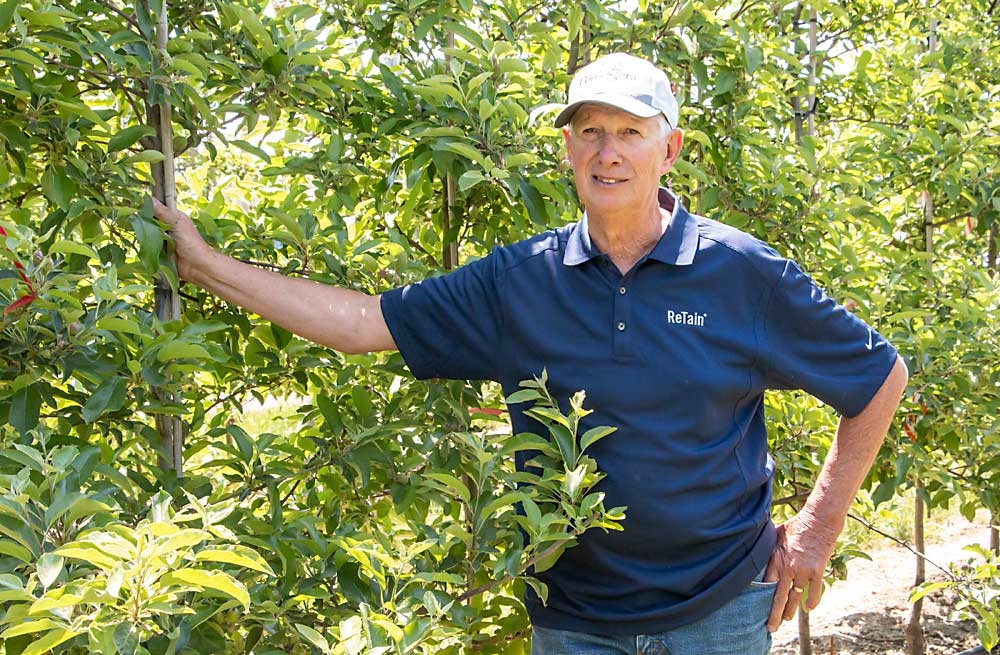
After spending decades helping Michigan apple growers, Phil Schwallier is now just an apple grower himself.
Schwallier, 69, retired from Michigan State University last year, after nearly 42 years as an extension educator in greater Grand Rapids, which contains the Fruit Ridge, the state’s largest apple region. He’s only working for himself now on about 100 acres of apples, facing the same challenges and opportunities that face any other commercial grower.
Although he has more time to spend on his own farm, off-farm tasks still keep him plenty busy. He joined the board of the Michigan Apple Committee earlier this year, which he could not have done when he worked for MSU. Instead of organizing and speaking at field days and conferences, he’s just another grower in the crowd now — or at least he tries to be. As an educator who held the mic for so long, walking away from his old role hasn’t been easy.
“I’m still working all the time,” Schwallier said with a chuckle. “But I have a passion for growing fruit and for the fruit business. It doesn’t seem like work to me. It seems like fun.”
Take June 3, for example: He spent the morning reviewing the results of chemical thinning trials in a couple of peach orchards, spent the afternoon with his MSU successor spraying an apple orchard as part of a different trial, and spent the evening sitting in on a virtual conference. He tried to stay in the background during the peach event, but soon enough was speaking to the group, providing valuable context informed by his decades of experience.
“He attempts to hang out in back of the crowd, but he has so much expertise and he’s so well known that he continues to be called upon to share his knowledge and insight,” said RJ Simons, president of Michigan Pomesters, a grower group that organizes educational orchard tours and events. “I don’t ever see Phil removing himself from those discussions. He’s so passionate about the tree fruit industry and enjoys it so much.”
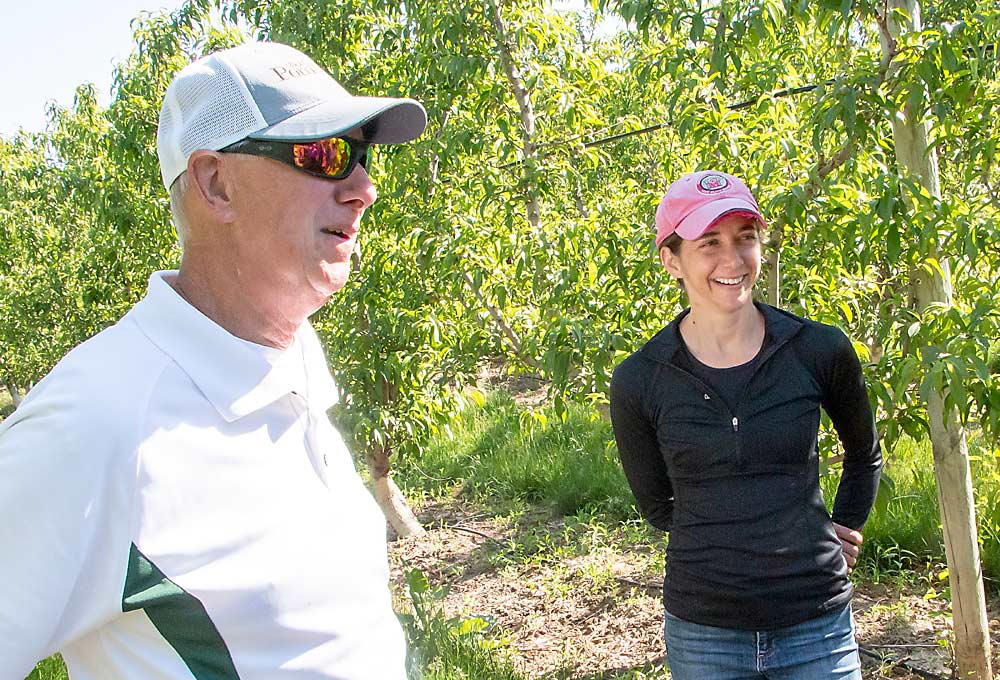
Schwallier isn’t a “glory hound,” said Amy Irish-Brown, a fellow extension educator who worked with him for more than two decades. He just has a generous nature and a desire to help his fellow growers.
“He’s just so great at sharing,” she said. “If a question needs to be answered, he’ll step up.”
Schwallier has roots in the Fruit Ridge — and branches reaching throughout the network of families that own many of its orchards. He was raised one of nine children on a fruit and beef cattle farm in Coopersville, a small town on the western edge of the Ridge. His wife, Judy, grew up on a Ridge dairy farm. Their four children and six grandchildren stuck close to home, too.
“I joke that Judy is related to one half of the Ridge, and I’m related to the other half,” he said.
Schwallier earned an MSU bachelor’s degree in horticulture in 1975. He spent a few college summers working in integrated pest management and orchard scouting programs, which sparked his interest in extension work. Shortly after getting a master’s degree in entomology in 1978, he got the job he wanted: extension horticultural agent serving the Fruit Ridge and beyond.
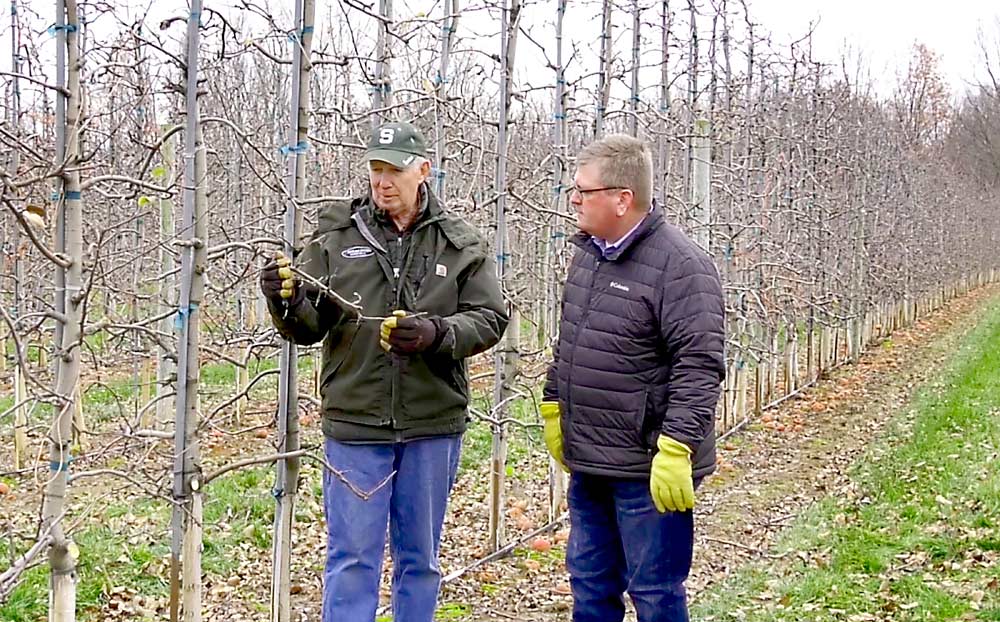
The Ridge — with its heavy clay soils, slight elevation and partial frost protection provided by Lake Michigan — was already Michigan’s largest apple-producing region at the time. Over the next few decades, Schwallier saw growers adopt trickle irrigation, herbicides, fertilizers, plant growth regulators, integrated pest management, pheromone traps, frost fans, tower sprayers, robotic harvest aids and platforms, controlled atmosphere storage, and new varieties and rootstocks. The changes keep coming, he said.
“I’ve been very fortunate to have worked in an industry that’s dynamic and prosperous,” he said.
1978 was a big year for Schwallier: He got a master’s degree and a job. He also got married. He and Judy bought an old dairy farm the next year, complete with house, barns and 15 acres. They still live there today. It was a good site for fruit, so they planted some trees. Located next to a main road, it was an ideal location for a roadside market, too. In 1989, Judy started selling fruit from a picnic table underneath a tree. Since then, Schwallier’s Country Basket has grown into a multifaceted agritourism operation.
Schwallier kept planting apple trees. He handled the load of being an extension educator, grower and farm marketer by getting a lot of help. His father, Fred Schwallier, and father-in-law, Carl May, both took care of his fruit trees when he was busy with his extension duties, while Judy ran the market with help from their children — and now grandchildren.
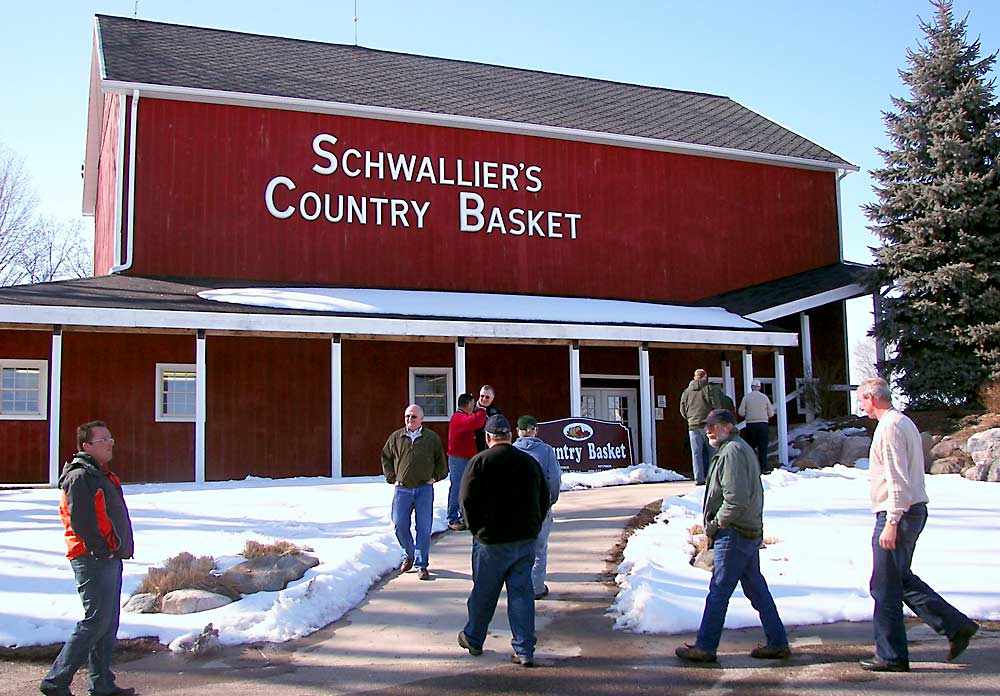
His dual roles as grower and educator made him better at both jobs, he said. His extension discoveries made him a better apple grower, while his grasp of commercial growing helped him recognize if an extension idea was actually workable. It also allowed him to explain his findings to growers in terms they could understand.
Schwallier loved extension work, but it consumed a lot of hours and miles. He went back and forth about retiring, but eventually decided it was time someone else took over.
“The day I retired, it was like a weight was taken off my shoulders,” he said. “I didn’t have to worry about weather as much, or crops and trees I didn’t even own.”
MSU hired Anna Wallis to succeed Schwallier earlier this year. He’s been getting her up to speed on various research trials, in an effort to keep continuity between his program and the future. They’ve also spent time driving around the Ridge, while he shares his wealth of knowledge about the region, Wallis said.
Schwallier’s need to stay engaged with the industry doesn’t surprise his wife. Judy doesn’t see him slowing down any time soon.
“A lot of growers are still his very good friends,” she said. “If they call and ask, he’ll go there.”
—by Matt Milkovich

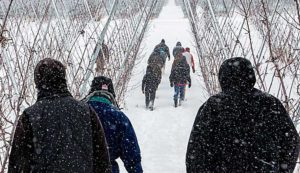
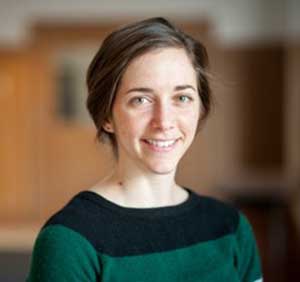





Leave A Comment